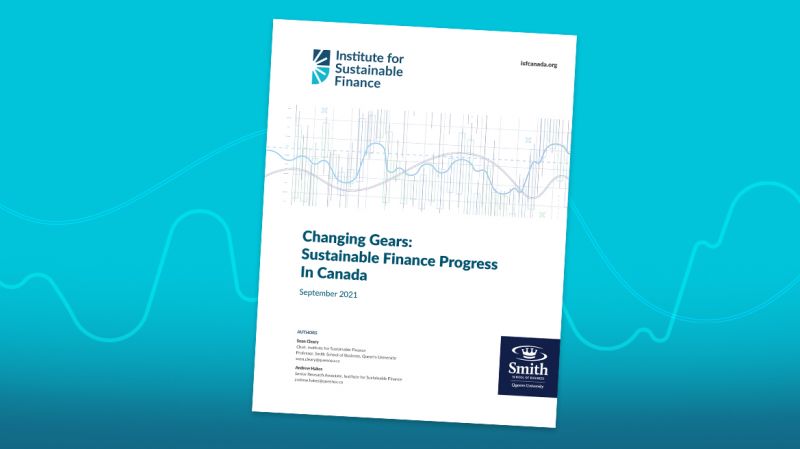In Canada, Sustainable Finance is Stuck in First Gear
An overly cautious approach has left the country playing catch-up

A new report by the Institute for Sustainable Finance (ISF), housed at Smith School of Business, provides a sobering assessment of how quickly sustainable finance is scaling in Canada. The conclusion: progress lags in many key areas, with the public sector particularly slow off the mark.
The ISF uses the final report of the Canadian Expert Panel on Sustainable Finance, published in 2019, as the benchmark, assessing how far along the public and private sectors are in implementing the Expert Panel’s 15 recommendations.
On the positive side, Canada’s low-carbon pathway is largely mapped and supported by a capital plan. And credit the federal government for creating the Sustainable Finance Action Council to harness financial expertise in the public and private sectors.
On the other hand, the ISF report points out, limited or no work has been done to help Canadians connect their savings to climate objectives or to engage institutional investors in financing Canada’s future electricity grid. And there are many more Expert Panel recommendations struggling to gain traction.
According to the report’s findings, the most pressing priority is to catch up on the table stakes: policy certainty and decision-useful information. This includes mandating disclosures and clarifying the scope of fiduciary duty in law and practice, which is essential guidance for asset managers and investors.
The report also stresses the importance of generating more investment in clean innovation. The shopping list is lengthy, from capitalizing on hydrogen and mineral-to-battery supply chain opportunities to electrification, building retrofits and climate-smart infrastructure. This will require co-operation among the public and private sectors and all players in the financial system.
As part of the report, the ISF conducted a “landscape review” and interviewed 34 experts, including the governor of the Bank of Canada, leaders from the “Big Five” Canadian banks, representatives from Canada’s largest insurance companies and pension funds, global market experts and investors.
From these interviews, the following seven themes emerged:
- Accelerated action and execution is needed. Canada must catch up to Europe and the U.K. At present, the private financial sector is moving faster than government and regulators in Canada. The private sector is waiting for the government to set the framework and standards, which will unlock investments that industries need to transition to a net-zero economy.
- Our financial ecosystem must embrace change. Sustainable finance has moved beyond a functional requirement for firms and is now a commercial imperative. As a result, there’s strong support within Canada’s investment industry and financial institutions to shift their attitudes and behaviours.
- Canadian-specific solutions are required. This includes sector-specific decarbonization pathways and transition scenarios that are supported by research within a Canadian context. The most challenging sector undergoing this process is oil and gas, where the transition can lead to widespread pain if not done carefully.
- Sustainable finance must include more than climate. In the context of COVID-19 and Canada’s urgency to reconcile with Indigenous peoples, there is a need for a broader, inclusive and socially concerned conversation on sustainable finance.
- Canada’s net-zero transition requires a more unified approach and narrative. The concept of net zero is still not well defined and understood. As a result, which activities and actions count as net zero are open to debate and likely to be industry-specific. A centralized voice and perspective would help, as would stronger communication channels across public and private sectors.
- While climate mitigation is critical, we need a greater focus on adaptation and resiliency. With the increasing number and intensity of fires and floods across the country, climate resilience and adaptation are priorities. As well, there are growing concerns about access to reinsurance, as the large reinsurers are European and feeling the pressure to transition away from high-carbon sectors.
- Clean innovation and other opportunities need more support. The importance of capitalizing on cleantech opportunities—as well as our lack of progress to date—is top of mind. Technologies to support oil and gas transition such as hydrogen and carbon capture and storage are frequently raised as Canadian opportunities. With proper planning and support, Canada can become the responsible supplier of choice for low-carbon commodities and minerals that will contribute to net-zero economies.
The ISF report characterizes Canada’s transition to a sustainable economy as both a sprint and a marathon. So far, we don’t seem to be fully in either race, though a unified approach and a flow of private capital can help Canada make up a lot of ground.
In his foreword to the report, Andy Chisholm, who is a member of the Expert Panel and also sits on Royal Bank of Canada’s board of directors, noted: “The central message from this ISF report is that we can and must do better. Time is of the essence and Canada needs to up its game in its efforts to develop a competitive and sustainable economy, which supports an inclusive and successful transition to net-zero. This analysis is not a surprise, but it is another wake-up call to the public and private sectors that timely implementation is critical.”